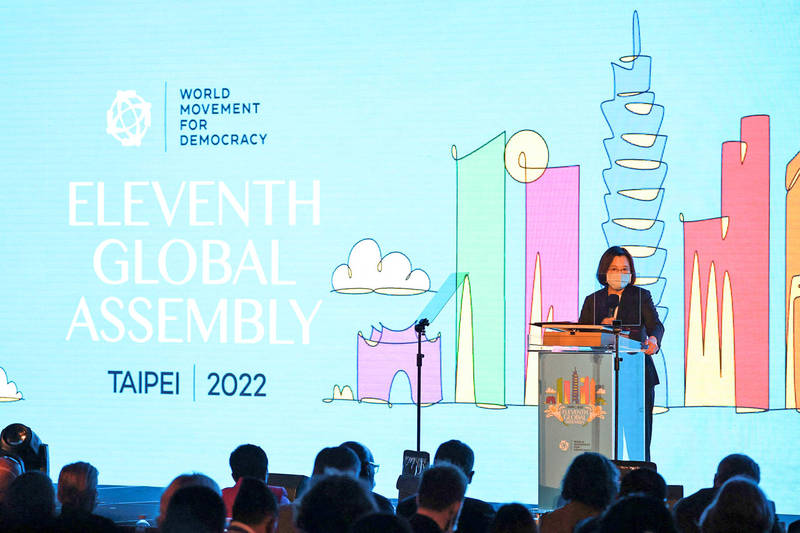《TAIPEI TIMES》Tsai warns of threat to global order

President Tsai Ing-wen speaks on the first day of the Global Assembly of the World Movement for Democracy in Taipei yesterday. Photo: Ann Wang, Reuters
DEMOCRACY SUMMIT: The president said that Russia’s invasion of Ukraine showed the world that authoritarian regimes will do whatever it takes to achieve their goals
Staff writer, with CNA
Democracies that value the rules-based international order are facing “the greatest challenges since the Cold War” as the likes of Russia and China continue working to erode democratic institutions, President Tsai Ing-wen (蔡英文) told an international democracy event in Taipei yesterday.
Tsai was speaking on the first day of the Global Assembly of the World Movement for Democracy, which ends tomorrow.
More than 300 rights advocates, politicians and donors from 70 countries have been brought together to discuss ways to counter authoritarian challenges and foster democratic momentum at the 11th global assembly, the organizers said.
Russia’s invasion of Ukraine in February showed the world that authoritarian regimes will do whatever it takes to achieve their expansionist ambitions, Tsai said.
In the past few years, China has engaged in military intimidation, cyberattacks, influence operations and economic coercion against Taiwan with the aim of instilling fear, creating doubt and obliterating confidence in the democratic system, she said.
The challenge posed by authoritarian regimes is an important wake-up call for democracies worldwide, she said, adding that democratic partners must work together to “strengthen our resilience and safeguard our values.”
She also called for a better understanding of authoritarian tactics to develop strategies to “counter the influence exerted by authoritarian regimes.”
Meanwhile, Hong Kong democracy advocate Nathan Law (羅冠聰) underlined the importance of supporting democracy protesters, as well as “the exile community,” as part of efforts to combat the rise of authoritarianism.
People who have been fighting for democracy on the ground or forced to leave their own country following their involvement in democratic movements are “the main source of rebellion” in the face of authoritarian regimes, said Law, who is based in the UK.
Law, who was a student leader in the 2014 “Umbrella movement” in Hong Kong, left the former British colony in June 2020 for fear of being targeted by the National Security Law, which has led to the prosecution of several democracy advocates and media workers since its implementation.
Law expressed concern over the lack of enthusiasm among young people about what he called the “traditional political system.”
While young people have been politically active in social movements seeking to fight climate change and poverty, many of them have regarded electoral politics as a mechanism that serves rich and powerful people instead of a means for change in society, he said.
“They don’t believe the system they are in is capable of changing all those problems... They don’t believe that their vote counts,” Law said.
He called for ways to encourage and invigorate young people in the democratic world to participate in politics and believe in the political system in their countries.
Meanwhile, Nobel Peace Prize laureate Maria Ressa spoke about the effects of “fake news and disinformation” on elections in democratic societies worldwide.
Ressa — cofounder of Rappler, a Philippine-based online news firm, and chairwoman of the World Movement for Democracy’s steering committee — said that fake news and disinformation are being spread six times faster than facts on social media platforms.
“If we have no integrity of facts, then we have no integrity of elections,” Ressa said, adding that facts, the truth and trust are the keys to maintaining the democratic system and preventing elections from being manipulated.
If the problem of fake news and disinformation is not addressed through dramatic reforms in the next two years or so, “there will be more illiberal leaders elected democratically, tipping the balance of power globally, from democracy to fascism,” she said.
新聞來源:TAIPEI TIMES
















